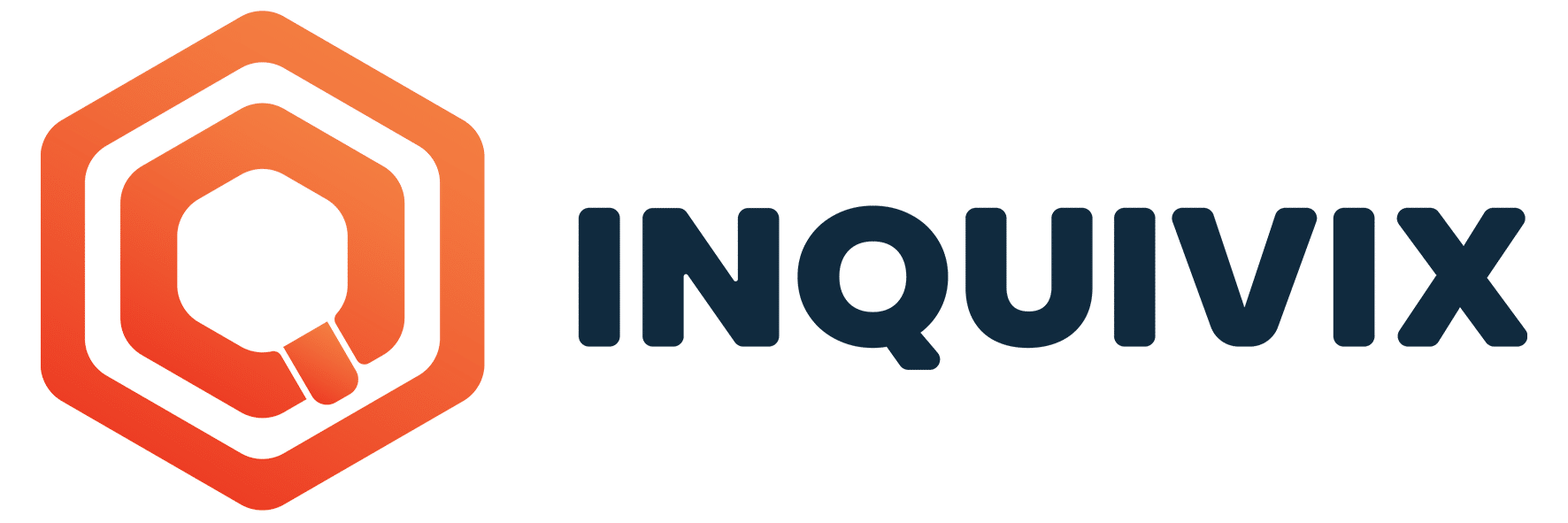Inquivix HQ
1-903, 18 Eonju-ro 146-gil,
Gangnam-gu, Seoul, Korea
06057
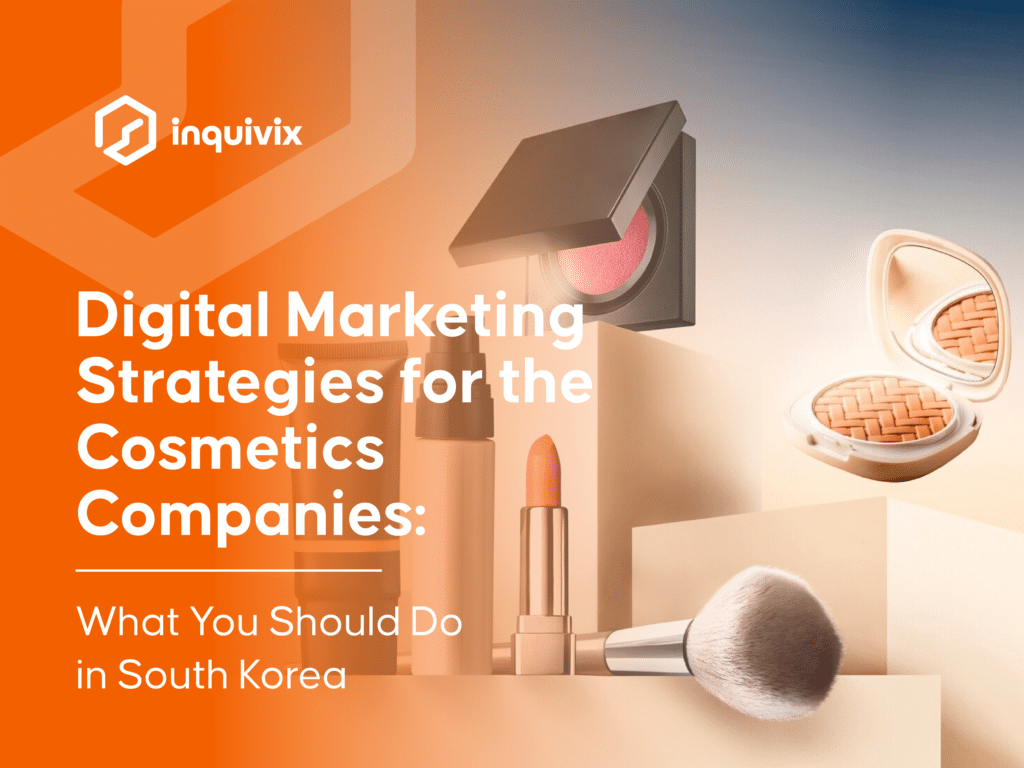
The cosmetics industry has a rich history and high demand from both genders. It has made its presence felt across every corner of the globe. From the USA and France to Japan, South Korea, and India, the cosmetics sector acts as a major contributor to these countries’ economies. With its close ties with other domains such as skincare, body care, and beauty products, the scope of the cosmetics industry extends beyond a single specified area. South Korea is one of the biggest markets for cosmetics, with very high competition. Thus, cosmetics companies planning to enter this market need to employ effective digital marketing practices to establish themselves and reach their potential clientele.
In this article, we delve deep into the study of the cosmetics industry in South Korea, exploring its functioning and the in-depth integration of digitalization. Further, we will unravel the best digital marketing strategies for cosmetics companies operating in South Korea. Let’s dive in.
Understanding the Cosmetics Industry
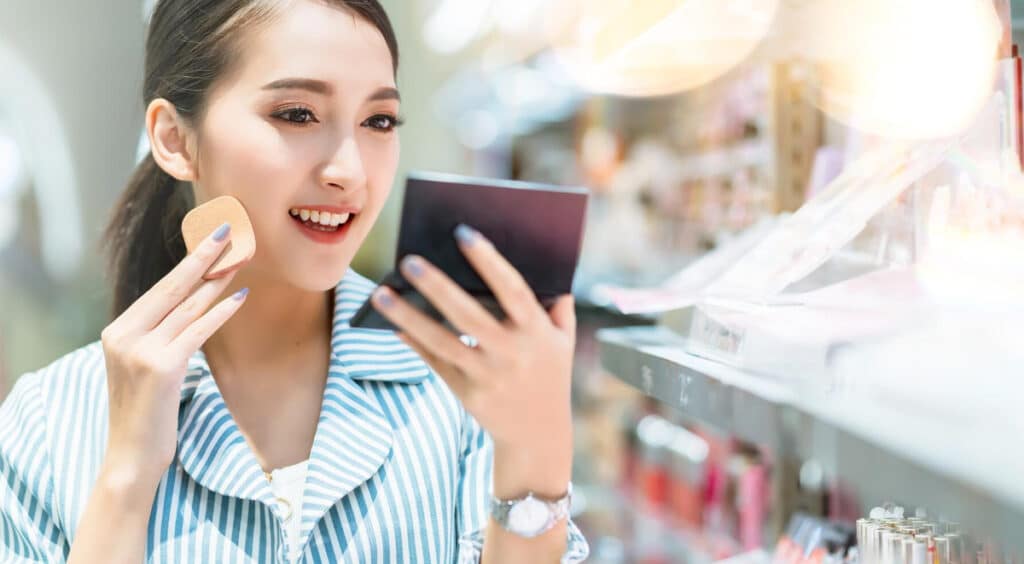
Before we delve into diverse strategies, it’s crucial to fully comprehend the nature of the cosmetics industry. This sector’s roots can be traced back to ancient Egypt. Although the fundamental concept of cosmetics hasn’t strayed far from ancient practices, the industry itself has evolved significantly. Once primarily targeted towards women, the marketing landscape has changed, now capturing the interests of both men and women alike.
But what precisely are cosmetics? They can be defined as any substance designed to enhance an individual’s appearance or compliment their inherent allure. These include products ranging from makeup and perfume to lotion and nail polish.
A fascinating aspect of the cosmetics industry is its powerful impact on the world’s economy. The beauty and cosmetic product market has evolved into a colossal industry worth several billion dollars. In the United States alone, yearly sales approach an impressive $10 billion USD. This growth trend isn’t confined to just the US, as Asian nations such as Korea, Japan, and India also paint a similar flourishing picture.
Leading contributors to this flourishing market are companies within the cosmetics sector. The price points of cosmetic goods vary widely; while some are affordable for the average consumer, others command higher price tags due to their luxury status. A distinctive feature of this industry is branding – often, the brand’s value surpasses the product’s intrinsic worth, particularly when celebrities endorse it. A single product can sell out swiftly when paired with a celebrity collaboration.
Reflecting upon the industry’s characteristics, we can identify it as a progressively evolving sector, continually expanding due to rising demand and ongoing research and development. Hence, every day brings something new to this vibrant and dynamic cosmetics industry.
A Glimpse into South Korea’s Cosmetics Industry
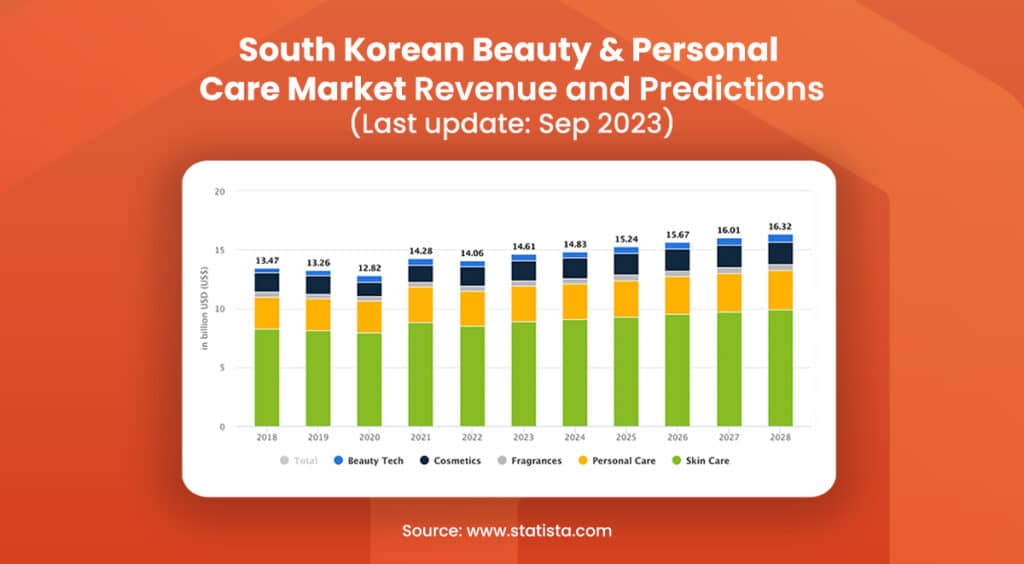
South Korea leads in many industrial sectors, and the cosmetics industry is no exception. This thriving sector plays a substantial role in driving South Korea’s reputation as one of the highest contributors to the global economy. Recognized as a global ‘trendsetter’, South Korea is renowned for its creativity, mild ingredients, and appealing packaging of its cosmetic products.
Ranked among the top 10 global markets for cosmetics, South Korea consistently introduces innovative products and sets global trends. Its beauty market is one of the fastest-changing in the world.
The COVID-19 pandemic posed significant challenges for every industry, including cosmetics in South Korea. However, the industry managed to weather the storm. Despite a general decline in local beauty market sales, trade balances and total exports of K-beauty products increased by approximately 16% and 14%, respectively, in 2021.
The international demand for K-beauty products is colossal, allowing even new Korean beauty companies to successfully penetrate the global market. Companies are investing heavily in creative and appealing packaging to underscore their products’ benefits. To stay abreast of the latest beauty trends, many companies are strategically acquiring K-beauty start-ups and brands. Cosmetics with clean labels and claims such as “cruelty-free” and “eco-friendly” are increasingly prevalent in the market.
Forecasted to grow at a compound annual growth rate (CAGR) of 5.5% through 2026, the South Korean cosmetics industry shows promising signs of sustained expansion. This growth is driven by factors such as increased online sales, public outdoor mobility, and high product innovation. Furthermore, South Korea’s vibrant celebrity culture is influencing men to incorporate cosmetics into their grooming routines, heralding a new era for the cosmetics industry in the country.
The Effect of Digital Marketing on South Korea’s Cosmetics Industry
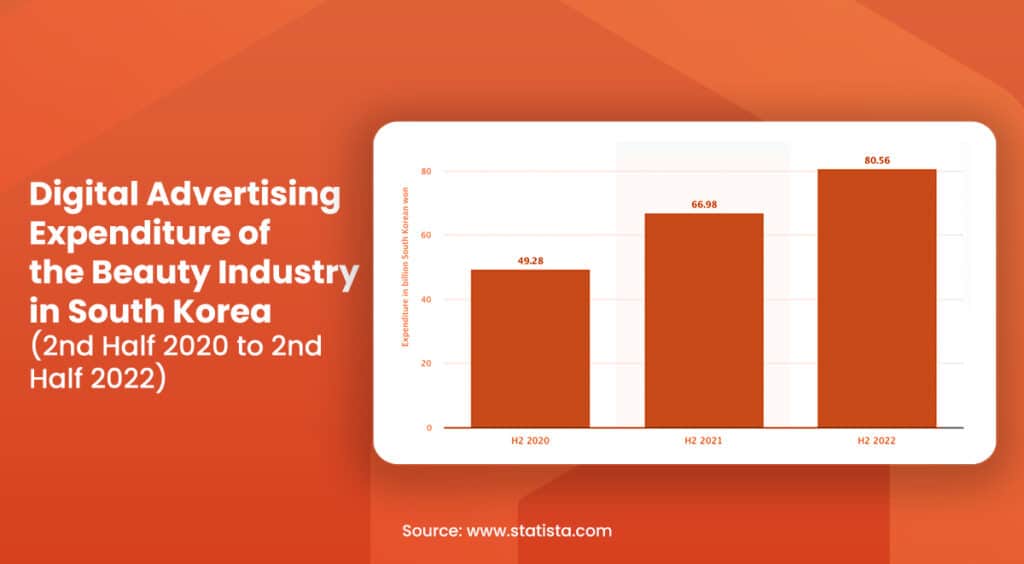
As one of the most digitally active societies globally, South Koreans have embraced the rapid shift to online platforms, and the cosmetics industry has been quick to follow. Recognizing the influence of digital platforms on consumer behaviors, Korean cosmetic brands have adopted various innovative digital marketing practices to engage with potential customers.
The cosmetics market in South Korea is influenced heavily by the digital culture embedded in Korean society. The impact on consumers is significant, as they rely on digital platforms for product discovery, reviews, and purchasing decisions. This digital trend is changing traditional marketing norms and mandates an effective marketing strategy that aligns both with the digital landscape and the unique aspects of Korean culture.
By employing targeted digital marketing campaigns, Korean cosmetic brands can reach larger audiences, engage consumers more interactively, and gather insights into market trends and consumer behaviors. This digital engagement, coupled with a deep understanding of Korean culture and societal norms, enables these brands to create a strong online presence and boost their market share. The power of digital marketing lies not only in widespread reach but also in personalization, catering to individual consumer preferences, a crucial factor for success in the Korean cosmetics market.
Top 5 Marketing Strategies for Cosmetic Companies in South Korea
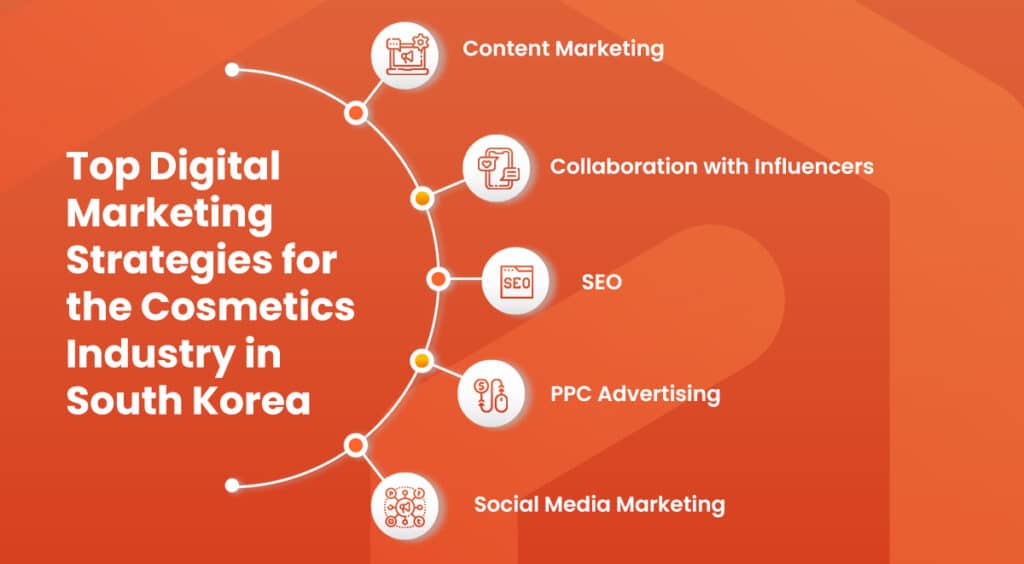
Entering the competitive landscape of South Korea’s cosmetics industry requires meticulous planning and strategic marketing initiatives. Adherence to a well-crafted plan can set a beauty brand on a trajectory of unsurpassed growth and substantial sales revenue. Here, we delve into the top five strategies that cosmetic companies can employ in the South Korean market.
Content Marketing
One key to effective digital marketing is the creation of captivating content that syncs with the latest news and events impacting the beauty sector. Companies should conduct thorough audience research to ensure their content meets market needs and educates potential customers. Maintaining brand message consistency across multiple platforms, from blogs to user-generated content, can yield optimal results from content marketing.
Utilizing Naver Blog
Naver Blog holds a significant place in South Korea’s digital realm. As the country’s premier blogging platform, it offers a unique blend of features designed to enhance user engagement, including seamless integration with social media and capabilities for sharing images and videos.
Its widespread popularity among South Koreans makes it an invaluable tool for cosmetic businesses aiming to establish a strong online presence. By sharing engaging and relevant content – whether it’s insightful articles, vibrant images, or captivating videos – brands can connect directly with their target audience, fostering a sense of community around their products.
Beyond just building connections, Naver Blog can significantly contribute to enhancing a brand’s authority and credibility. Regularly posting well-researched, informative content can position a company as an expert in the cosmetics field, instilling trust and confidence in potential customers. Over time, this can translate into stronger customer loyalty and increased sales.
Video Content
Video content marketing is a potent tool that can significantly enhance engagement and brand visibility, particularly in industries where visual appeal is highly valued, such as cosmetics. In South Korea, a country renowned for its sophisticated digital landscape, leveraging video content marketing has become a strategic imperative for cosmetic brands. Platforms like YouTube and Instagram are at the forefront in this space, hosting millions of videos and serving as a treasure trove of information, reviews, tutorials, and product launches in the cosmetics sector.
Video content allows brands to reach a massive audience. Cosmetic companies can leverage this by creating engaging video content featuring product demonstrations, makeup tutorials, customer testimonials, and behind-the-scenes looks at product development and manufacturing. Partnering with popular beauty vloggers for product reviews or sponsored content is also an effective approach, as these influencers often have a significant following of dedicated viewers who trust their opinions and recommendations.
Influencer Marketing
Partnerships with influencers can significantly boost a cosmetic brand’s growth, given the high demand for beauty influencers in South Korea. Many cosmetic brands engage influencers to promote their products on social media and other platforms, leveraging their online reviews for business growth.
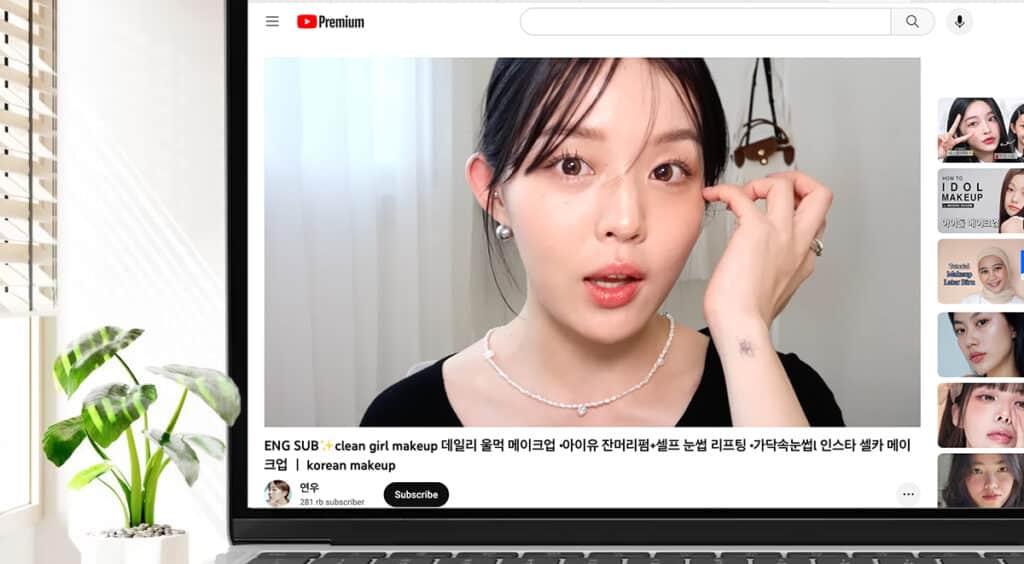
Engaging Key Opinion Leaders
Key Opinion Leaders (KOLs) – experts in their respective fields, like beauty care professionals or dermatologists – are not simply influencers. Their expert opinions shared on social media are highly valued, making KOL engagement a necessary component of strategic marketing for cosmetic brands.
Effective Search Engine Optimization
For cosmetics companies, Search Engine Optimization (SEO) is a powerful tool to bolster visibility on Search Engine Results Pages (SERPs), thus driving organic traffic and cultivating customer loyalty. Particularly in the beauty sector, a robust SEO strategy can significantly enhance reach to target audiences while optimizing the website’s performance.
Effective SEO implementation involves several crucial steps:
Keyword Research
Conducting in-depth keyword research is fundamental to understanding what terms or phrases potential customers use when seeking products or services similar to yours. These keywords will guide the content creation strategy, ensuring that the material is both relevant and easy for search engines to index.
Meta Titles, Descriptions, and Tags
An integral part of SEO, meta titles, descriptions, and tags inform search engines about the page’s content. Filled with relevant keywords, these elements can improve the page’s ranking and click-through rates.
Website Optimization
Ensuring your website is optimized for target keywords is crucial. This includes integrating keywords into web content, URLs, image alt text, and headers. It’s essential to balance incorporating keywords with creating content that’s engaging and valuable to the reader.
Performance Optimization
Speed and overall website performance impact SEO significantly. Websites that load quickly and provide a smooth user experience have a higher chance of ranking well.
Mobile-Friendliness
With the rising prominence of mobile browsing, making websites mobile-friendly is no longer optional. Google’s mobile-first indexing means that the mobile version of the website is considered the primary version. Hence, ensuring your site is mobile-friendly can enhance its performance on SERPs.
Content Optimization
The use of optimized content, such as blogs and articles, is an effective way to incorporate keywords naturally. Quality content drives engagement, keeps visitors on your site longer, and encourages them to share your content on their social channels.
PPC Advertising
Pay-per-click (PPC) advertising is a potent digital marketing technique that cosmetic companies can exploit to significantly enhance their online visibility and drive targeted traffic to their websites. In a PPC campaign, businesses pay a fee each time one of their ads is clicked. Essentially, it’s a way of buying visits to your site rather than attempting to earn them organically.
PPC Advertising in the cosmetics industry can be a game-changer, offering several benefits. Firstly, it delivers quick results. Unlike SEO strategies that take time to yield results, a well-structured PPC campaign can drive substantial traffic to a website almost instantly after launch.
Secondly, PPC provides highly targeted traffic. Advertisers have many options to ensure that their ads are only displayed to a specific demographic, including location, language, device, and time of day. This targeted approach is critical in a diverse and segmented market like cosmetics, where customer preferences can significantly vary.
Thirdly, PPC allows for measurable results. Businesses can know exactly how much they are spending and what they are getting in return, down to the number of clicks, visits, leads, and sales. This ability to measure outcomes enables companies to fine-tune their advertising efforts for maximum ROI.
Lastly, PPC can significantly enhance brand exposure. Even when users don’t click on the ads, the brand name and message still get noticed, increasing brand awareness.
Implementing a successful PPC strategy requires careful planning, ongoing testing, and continuous optimization. For the cosmetics industry in South Korea, PPC advertising can open doors to a broader audience, higher sales, and a more robust online presence.
Social Media Marketing
In a digitally interconnected nation like South Korea, where the internet penetration rate stands at a staggering 97%, social media platforms play a significant role in fostering business growth, especially for new entrants in the market. Platforms like Naver, Facebook, Instagram, and TikTok have amassed a vast user base in the country, presenting an enormous opportunity for cosmetic brands to engage directly with their target audience.
Implementing a robust social media strategy is a dynamic way for cosmetic companies to broaden their reach, enhance brand recognition, and accelerate customer engagement. Through regular posts, companies can disseminate information about new product launches, highlight customer testimonials, and offer beauty tips, all of which can stimulate interaction and interest in short time frames.
Moreover, the real-time communication offered by social media platforms allows cosmetic businesses to quickly answer queries, respond to customer feedback, and deliver personalized customer service. This immediate interaction helps build a strong bond with customers, making them feel valued and appreciated.
In addition, these platforms serve as treasure troves of information on customer behaviors and preferences. This data is key for cosmetic brands to tailor their marketing strategies and refine their product lines, ensuring they resonate with their target audience.
In the dynamic world of South Korea’s cosmetics industry, effectively using social media marketing can significantly increase a brand’s visibility, foster better relationships with customers, and, in the end, boost sales. It’s like giving your brand a friendly, approachable face that people can connect with, ultimately leading to a community of loyal customers.
Embarking on Your Success Journey in South Korea’s Cosmetics Industry

Breaking into South Korea’s cosmetics market is like opening the door to an exciting new world. But it’s important to remember that this is a world with its own rhythm, marked by unique cultural nuances and rapidly evolving consumer tastes. If you’re ready to make your mark here, you’ll need a trusted guide to help you navigate the terrain.
That’s where Inquivix comes in. We’re not just experts; think of us as your companions on this journey to business success. We offer an array of digital marketing services, from content and video marketing and influencer collaborations to social media management, SEO, and more.
With Inquivix in your corner, you can be confident that your plans will unfurl just right, bolstered by our expertise. We’re here to answer your questions, share our knowledge, and celebrate your victories. So, if you’re curious about the road ahead, don’t hesitate to reach out. We’re excited to embark on this journey with you.
FAQs
South Korea’s advertising landscape is quite diverse, with television, online platforms, and print media among the most commonly used channels. Online advertising encompasses an array of methods, such as display advertisements, search ads, and social media promotions.
Marketing effectively in South Korea involves a deep understanding of local culture and consumer behavior to tailor your messaging accurately. It’s essential to forge relationships with Korean influencers who can boost your brand’s visibility and credibility within the local market. Using social media and other online platforms is crucial in this highly digital society. Emphasizing mobile marketing is equally vital, considering the high smartphone penetration in the country. Lastly, to navigate the unique South Korean landscape successfully, partnering with a local Korean agency can provide invaluable insights and assistance.
